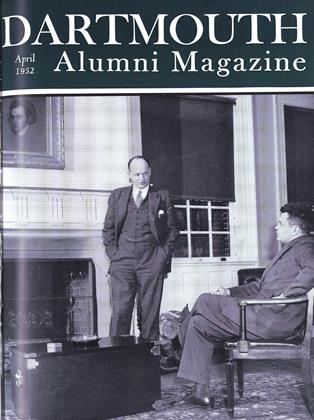President Dickey's ConvocationWords Take on Concrete FormIn a Varied Guidance Program
Like any individual on his own, the average Dartmouth undergraduate has personal problems. He is fortunate, however, in having freely available to him a College advisory and guidance program that has been developed to the point where it is virtually impossible to think of any difficulty on which he cannot get competent, sympathetic help.
These photographs do not cover the entire program but are intended to show something of the scope and variety of the services offered, from the clinics in speech, writing and speeded reading, through finances, health, employment, religion and military service to a staff psychiatrist. There are other, more general forms of individual guidance, such as the work of the advisers for incoming freshmen and the numberless hours every teacher spends in conferences ironing out academic difficulties and supplementing classroom work with individual help.
Advice from fellow students is also free but hardly reliable. What may be needed, to crown the College's program, is a corps of advisers to advise students to use the experts and to take advantage of the helpful services at their disposal.
EACH DARTMOUTH FRESHMAN is assigned to an adviser who helps him make the adjustment to college life and is on call for assistance throughout the year. Prof. John B. Stearns '16, one of a hundred such faculty advisers, is shown above with Dwight K. Andrew Jr. '55 of Portland, Me., one of the seven advisees he keeps in touch with.
SPEEDED READING is designed to help students to do their college work more rapidly and to improve their comprehension in reading. This work is directed by Prof. Robert M. Bear of the Psychology Department, shown explaining some of the special equipment used in the remed'al program.
FINANCIAL AID is the special province of Prof. Francis J. Neef, whom students consult not only about scholarships, loans and jobs, but also about emergencies that throw budgets out of kilter.
WHEN WORRIES are of a psychiatric nature or are in danger of reaching that stage, the student is advised to talk things out with Francis W. King, psychology instructor and counselor on the staff of the Personnel Bureau. This service has for many years been part of the guidance program.
THE WRITING CLINIC, headed by Prof. Eric P. Kelly '06 of the English Department, helps students who have trouble getting their thoughts down on paper in clear, organized fashion. Every academic department is alerted to send these men to the clinic, which has achieved striking results.
IF IT'S RELIGION or an allied question that the student wants to talk about, he can turn to several persons, but the busiest adviser is George H. Kalbfleisch, graduate secretary of the Dartmouth Christian Union, shown entertaining a student at his home. Mr. Kalbfleisch was a Marine Corps chaplain during the war.
ACADEMIC WORK is the most common matter demanding individual advice and help. Student-faculty conferences meet this need and are an important part of every pro- fessor's teaching program. Above, Prof. Martin L. Lindahl is shown in his office with one of his economics students.
A HEALTH PROBLEM need never go unanswered if the student will take advantage of the free and remarkably fine medical service open to him. Above, Dr. Ralph W. Hunter '31, Medical Director of the College, questions a student at Dick's House.
CORRECTIVE EXERCISES for the individual student are frequently prescribed by the Physical Education Department. Prof. Harold M. Evans, department chairman, is shown directing such a workout at the gym.
JOBS AFTER GRADUATION are a prime concern of many seniors at this time of year. Donald W. Cameron '35, associate in placement in the Personnel Bureau, shown displaying a company brochure, gives experienced assistance on this problem. This year he reports a heavier demand for liberal arts men in all fields.
THE SPEECH CLINIC, like those in speeded reading and writing, exists to help the individual student who has a problem or wants to improve his abilities. Here, Prof. Carl D. England of the Speech Department is listening to a recording of the voice of the student with him.
THE FEMININE ANSWER to problems is not lacking either in the masculine confines of Dartmouth. Mrs. Margaret E. Broderick, hostess at Dartmouth House, gives advice and lends a helping hand on a great variety of matters that seem to stump "her boys."
 View Full Issue
View Full Issue
More From This Issue
-
 Article
ArticleAlumni Fund Makes Strong Start in Its 1952 Campaign
April 1952 -
 Class Notes
Class Notes1929
April 1952 By F. WILLIAM ANDRES, EDWIN C. CHINLUND, GEORGE B. REDDING -
 Class Notes
Class Notes1918
April 1952 By ERNEST H. EARLEY, DONALD L. BARR, RICHARD A. HOLTON -
 Class Notes
Class Notes1917
April 1952 By KARL W. KOENIGER, DONALD BROOKS, HOWARD A. STOCK WELL -
 Class Notes
Class Notes1950
April 1952 By ENS. SCOTT C. OLIN, SIMON J. MORAND III, GLENN L. FITKIN JR. -
 Article
ArticleWe Bought a Hanover Farm
April 1952 By ELLEN DUKE










